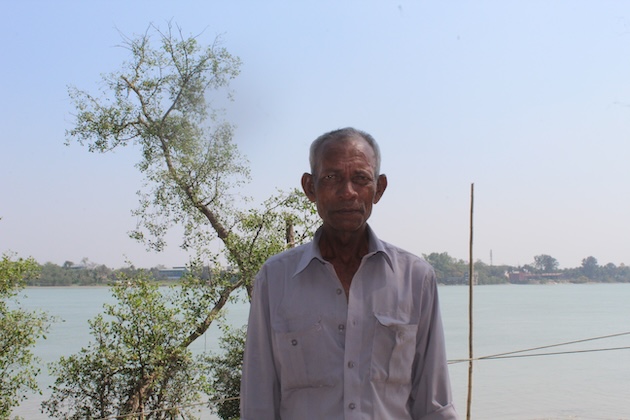
CHATTOGRAM, Bangladesh, Jun 10 (IPS) – Jishuram Das, a 60-year-old native of Jelepara, Chattogram, has caught fish from the Karnaphuli River since childhood. But these days he often sits idle without going out to catch fish because their catches have dropped dramatically.
“There was once a lot of fish in the Karnaphuli River, where we caught fish generation after generation. But in recent years, salinity has entered the river water, causing the disappearance of freshwater fish species, making our lives more difficult,” said Jishuram.
Recalling the time when fishermen could catch enough fish from the river some ten to twelve years ago and earn quite a bit of money by selling their catches, Jishuram said that today he can catch only half a kilo of fish per day and even he returns home empty-handed for many days.
“My son and I used to catch fish together from the Karnaphuli River. Since we can’t catch enough fish from the river to sustain ourselves, I don’t take my son fishing. I asked my only son to find an alternative livelihood. Now he works in a factory so he can support my family,” he said.
The veteran fisherman said that as he has no other job, he still continues traditional fishing despite the drastic decline of fish in the river.
“But many have already changed their livelihoods for a better life,” he says.
Gopal Das (55), who learned fishing from his father, said that when he was young, he used to catch big fish from the river with a fishing hook. But now he could not catch a single fish in a whole day as big fish have disappeared from the river due to uncontrolled pollution, he said.
“In the past, I used to catch big fish like rui (rohu fish), catla, chitol (chitala chitala) and boal (wallago fish), weighing 15-20 kg, from the river, but these are not there at the moment to find. We can now catch only three or four species of sea fish, including shrimp and poya fish; the river has become salty,” Gopal said.
Karnaphuli’s fishing families are struggling to earn a living and feed their families, and many have fallen into a debt trap.
Gopal, a fisherman living in Jelepara, said: “We have fallen into economic hardship. I borrowed Taka 30,000 (almost $300) from a microcredit organization, and now I am paying back the loan. Like me, many others around us get caught in the cycle of debt.”
Gopal has changed his profession and now works as an assistant to a bricklayer.
“So we don’t take our children to fishing boats anymore. We send our children to educational institutions so that they can choose professions other than fishing after completing their studies,” he added.
The younger generation of Jelepara has abandoned their ancient way of life.
“I used to catch fish from the Karnaphuli river, but now I work as a shopkeeper. There is a shortage of fish in the river, so I chose another job. The young generation is not interested in fishing and that is why they are looking for a job or other work,” says Soman Das (28).
Md. Sarowar Hossain Khan, city manager of the United Nations Development Program (UNDP), said they have been providing training to young fishermen on livelihood opportunities under the UN Development Programme. Livelihood Improvement Project for Urban Poor Communities (LIUPC). so that they can find suitable professions.
“Young people in Jelepara have been trained in driving and ready-made garments (RMG), while many of them have already switched to these from fishing,” he said.
a Study from 2016 revealed that salinity and dissolved oxygen (DO) were the two most important variables shaping species composition in the Karnaphuli River estuary. Species diversity was low because the estuary is highly polluted due to industrial pollution and high discharge of polluted material from oil tankers, fertilizer factories and Chattogram City Corporation.
Earlier in March 2024, several species of fish and aquatic animals died in Karnaphuli River due to melted raw sugar burnt in a firework at a warehouse in Chattogram. The burnt sugar fell into the river, causing the water quality to drop, causing the death of several fish species.
“Fish stocks in the Karnaphuli River have declined drastically due to overfishing and uncontrolled water pollution,” said Dr Mohammed Shahidul Alam, associate professor at the Department of Fisheries, University of Chittagong.
Factories and tanneries on the banks of Karnaphuli are discharging chemical waste into the river, destroying the habitat of aquatic species, he said, adding that climate change-induced salinity is also contributing to the rapid decline of freshwater fish species in the river.
IPS UN agency report
Follow @IPSNewsUNBureau
Follow IPS News UN Bureau on Instagram
© Inter Press Service (2024) — All rights reservedOriginal source: Inter Press Service







